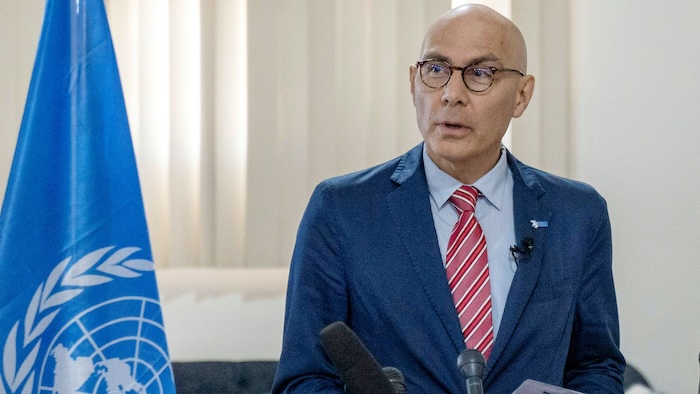
The Centre for Policy Alternatives (CPA) has issued a set of recommendations ahead of the official visit to Sri Lanka by United Nations High Commissioner for Human Rights Volker Türk, scheduled for June 23–26, 2025.
This visit is the first visit by a UN Human Rights Chief since the election of President Anura Kumara Dissanayake and the National People’s Power (NPP) government in 2024.
The CPA calls on the High Commissioner and the Office of the High Commissioner for Human Rights (OHCHR) to address key issues related to accountability, legal reforms, and human rights protections, particularly in the lead-up to the September UN Human Rights Council sessions, where Sri Lanka’s commitments will come under review.
United Nations High Commissioner for Human Rights visit to Sri Lanka: Recommendations and Key Issues for Consideration
June 2025
The United Nations High Commissioner for Human Rights H.E. Volker Turk is scheduled to visit Sri Lanka this month—the first visit by a High Commissioner since the 2024 election of President Anura Kumara Dissanayake and the National People’s Power (NPP) government.
The visit takes place at a key moment in Sri Lanka with the country grappling with the effects of its ongoing governance and economic crises, cycles of past violence, and the lasting effects of a nearly three-decade conflict. The 2024 change of government promised reform and reignited hope that a new political culture would emerge.
Yet, seven months later, the implementation of confidence-building measures and key governance and legal reforms has been delayed. A significant section of society also faces severe socio-economic challenges. Amidst such a context, human rights abuses persist. The recent use of the Prevention of Terror Act (PTA) has violated the due process of suspects.
Long-standing issues, such as land appropriation, continue to deny communities of their right to access, own and use their lands, freedom of movement, and means of survival. Reports of torture and custodial death have also occurred under the Dissanayake government. These and other issues expose the prevalence of human rights violations that threaten to reinforce historical patterns of violence and trigger future conflict. They are also critical indicators of the need for a prevention agenda and engagement in promoting human rights and strengthening the rule of law in Sri Lanka.
The visit takes place at this critical juncture when the government can be supported in their plans of implementing its own promises. In light of the impending visit, the Centre for Policy Alternatives (CPA) urges the High Commissioner and the Office of the High Commissioner for Human Rights (OHCHR) to inform their meetings and messages to the government, state entities, and others with the following recommendations:
- Have a genuine and open dialogue with victims, survivors, and civil society in Sri Lanka, including visiting the war-affected areas in the North and East.
- Highlight the need for concrete steps to address accountability in Sri Lanka. This includes the need for tangible and time-bound progress on emblematic cases, legal and structural reforms, including the establishment of the promised Public Prosecutor’s Office, and other necessary reforms to ensure an independent and credible judicial process in Sri Lanka.
- Emphasize the need for an immediate moratorium on the use of the Prevention of Terrorism Act (PTA) and its immediate repeal. Any future attempts at law reforms must adhere to international standards and be drafted after wide consultations.
- Highlight the need for other urgent legal reforms, including the repeal of the Online Safety Act (OSA), reform to the Muslim Marriage and Divorce Act (MMDA), the Vagrancy Ordinance, provisions of the Penal Code, and other measures to ensure equality, non- discrimination, and the dignity of all citizens.
- Raise concerns about ongoing efforts at land appropriation and occupation that have dispossessed many individuals and communities. Particular attention must be paid to acquisitions in the North and East, a cal for transparent land appropriation reforms that contain due process safeguards and address the grievances of affected communities.
- Visit sites of mass graves and raise the need for adherence to international standards of exhumation, recording, reporting, and identification.
- Reaffirm the right to religious worship and religious freedom.
- Raise the need for independent investigations into custodial torture and encounter kilings, accountability for such violations, and urgent reforms in this regard.
- Highlight the continued challenges faced in civic spaces, including administrative and security issues that impede the work of human rights defenders, civil society, community groups, media, and others.
- Urge the Government of Sri Lanka to address persistent socio-economic challenges, including through the introduction of governance reforms that are just, fair, and equitable.
- Emphasise the importance of undertaking constitutional reforms in a transparent and timely manner that facilitate the abolition of the executive presidency, address a political solution, and bring required checks and balances, among other key reforms. These reforms should include a full implementation of Sri Lanka’s existing constitution, especially concerning the limited devolution of power granted by the 13th amendment, pending constitutional reform.
- Raise the need for a new Resolution on Sri Lanka with a two-year reporting period, that provides for continued monitoring and support for human rights, accountability, and reconciliation. CPA also recommends the renewal of the OHCHR Sri Lanka Accountability Project (OSLAP) and its ability to visit Sri Lanka. The human rights, accountability, and reconciliation issues underscored in these recommendations require urgent attention. CPA calls upon the High Commissioner and the OHCHR to use this visit to highlight these concerns and emphasize the need for immediate action, including a time-bound roadmap for implementation of reforms. (Newswire)
